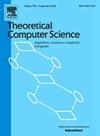Unit refutability of horn constraint systems - certification and parallel complexity
IF 1
4区 计算机科学
Q3 COMPUTER SCIENCE, THEORY & METHODS
引用次数: 0
Abstract
This paper is concerned with algorithmic procedures for checking if a Horn Constraint System (HCS) has unit refutations of linear feasibility. A Horn constraint is a linear constraint of the form , where each and at most one of the 's is positive. Horn constraints generalize Horn clauses and find applications in a number of practical domains such as program verification and econometrics. There exist quite a few algorithms in the literature for checking linear (and hence integer) feasibility in HCSs. We are concerned with the complementary problem, viz., that of finding refutations. In particular, we focus on unit refutations, i.e., refutations in which a unit variable constraint must be used in each inference step. Unit refutations are an analogue of unit resolution, which is a widely used refutation system in Boolean constraint solving. Whereas unit resolution is complete for Horn clausal systems, unit refutation is incomplete for HCSs. Although incomplete, unit refutations are very useful from the perspective of establishing a certain type of infeasibility. Our main contribution is showing that the problem of checking if an infeasible HCS has a unit refutation is in P. Towards this end, we provide two algorithms: a non-certifying algorithm which runs in time and a certifying algorithm which runs in time, where m and n are the number of constraints and number of variables in the input HCS, respectively. Our algorithms are based on a combination of new and existing insights regarding Horn constraints. What is particularly interesting about our approach is that we are able to efficiently certify the existence of a unit refutation, although the actual refutation itself could be exponential in the size of the input. From the perspective of parallel algorithms, we show that the unit refutation problem in HCSs is P-complete.2
喇叭约束系统的单元可辩驳性——认证和并行复杂性
本文研究了角约束系统是否具有线性可行性的单元驳斥的算法过程。Horn约束是形式为A⋅x≥b的线性约束,其中每个ai∈{0,1,−1}且ai中最多有一个是正的。霍恩约束概括了霍恩子句,并在程序验证和计量经济学等许多实际领域中找到了应用。文献中存在相当多的算法来检查hcs的线性(因此是整数)可行性。我们关心的是补充问题,即寻找反驳的问题。特别地,我们专注于单位反驳,即在每个推理步骤中必须使用单位变量约束的反驳。单位反驳是一种类似于单位分辨的反驳系统,是布尔约束求解中广泛使用的一种反驳系统。对于Horn子句系统,单位解析是完整的,而对于hcs,单位驳斥是不完整的。虽然不完整,但从建立某种不可行性的角度来看,单位反驳是非常有用的。我们的主要贡献是证明了检验不可行HCS是否具有单位反驳的问题在p中。为此,我们提供了两种算法:一种运行时间为O(m·n2)的非证明算法和一种运行时间为O(m2·n2)的证明算法,其中m和n分别是输入HCS中的约束数和变量数。我们的算法基于对霍恩约束的新见解和现有见解的结合。我们的方法特别有趣的是,我们能够有效地证明一个单位反驳的存在,尽管实际的反驳本身可能是输入大小的指数级。从并行算法的角度,我们证明了hcs中的单元反驳问题是p完全的
本文章由计算机程序翻译,如有差异,请以英文原文为准。
求助全文
约1分钟内获得全文
求助全文
来源期刊

Theoretical Computer Science
工程技术-计算机:理论方法
CiteScore
2.60
自引率
18.20%
发文量
471
审稿时长
12.6 months
期刊介绍:
Theoretical Computer Science is mathematical and abstract in spirit, but it derives its motivation from practical and everyday computation. Its aim is to understand the nature of computation and, as a consequence of this understanding, provide more efficient methodologies. All papers introducing or studying mathematical, logic and formal concepts and methods are welcome, provided that their motivation is clearly drawn from the field of computing.
 求助内容:
求助内容: 应助结果提醒方式:
应助结果提醒方式:


